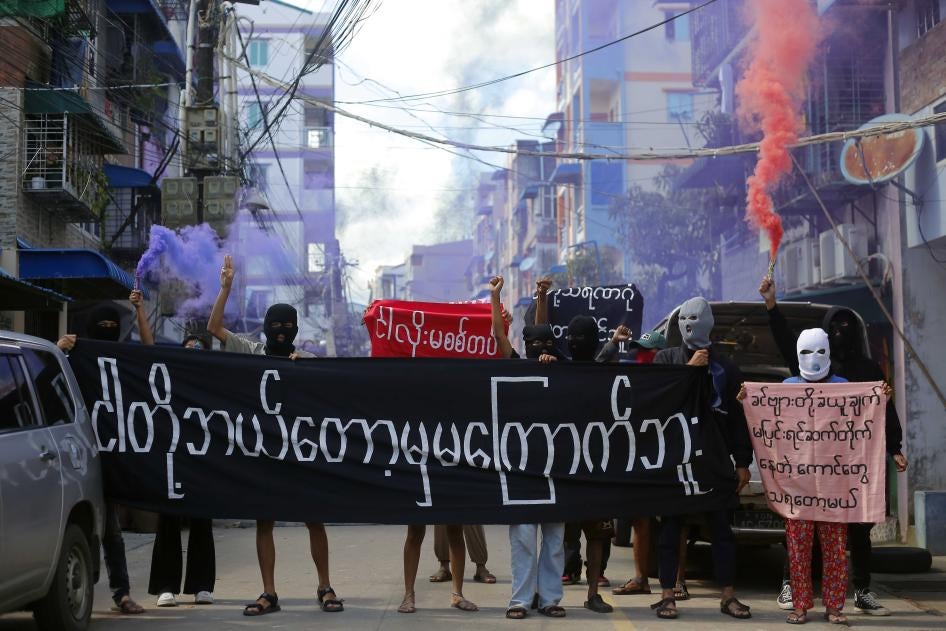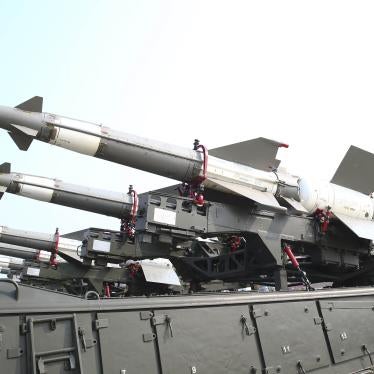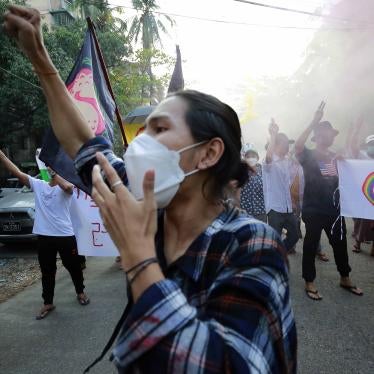(Bangkok) – Myanmar’s junta, in the two years since the military coup, has expanded its use of deadly force and repressive measures to squelch all dissent, Human Rights Watch said today. Foreign governments should coordinate increased pressure on the junta to establish fundamental freedoms and democratic civilian rule.
On February 1, 2021, the Myanmar military detained the country’s elected civilian officials, including de facto leader Aung San Suu Kyi. Since then, the junta has brutally cracked down on any opposition and severely restricted freedoms of speech, association, and assembly. At least 17,000 protesters and activists have been arrested and 2,900 killed, according to the Assistance Association for Political Prisoners, a nongovernmental group. The security forces have carried out arbitrary arrests, torture, sexual violence, mass killings, and other abuses that amount to crimes against humanity.
“Myanmar’s military junta has spent the two years since the coup engaged in a worsening spiral of atrocities against the people of Myanmar that amount to crimes against humanity and war crimes,” said Elaine Pearson, Asia director at Human Rights Watch. “Instead of proceeding with inevitably bogus ‘elections’ in August, Myanmar’s generals should be facing international consequences for their crimes.”
During expanded military operations, junta forces have been responsible for attacks on civilians that amount to war crimes against ethnic minority populations in Kachin, Karen, Karenni, and Shan States. The military has used “scorched earth” tactics, burning villages in Magway and Sagaing Regions.
The junta has blocked humanitarian aid from reaching millions of displaced people and others at risk in conflict areas. In Rakhine State – where Rohingya have long faced systematic abuse and discrimination that amount to crimes against humanity, including persecution and apartheid – security forces have imposed new restrictions on movement and aid. The restrictions have worsened food and water shortages and increased the risk of preventable diseases and severe malnutrition.
The United Nations Office for the Coordination of Humanitarian Affairs (OCHA) estimates that at least 17.6 million people in Myanmar are in dire need of humanitarian assistance. Fighting since the coup has displaced over 1 million people internally, while another 70,000 refugees have fled to neighbouring countries.
On December 21, 2022, a landmark UN Security Council resolution on Myanmar denounced the military’s rights violations since the coup but fell short of imposing a global arms embargo or referring the country situation to the International Criminal Court. Russia and China abstained from the vote, signalling the junta’s growing international isolation. Council members should pursue follow-up action by imposing an arms embargo as well as targeted sanctions on junta leadership and military-owned companies.
Concerned governments should more effectively target the military’s main revenue sources, particularly foreign currency revenues that the military obtains from exports like natural gas, metals, gemstones, and timber and uses to purchase weapons, military equipment, and fuel, Human Rights Watch said.
Targeted economic sanctions imposed by Canada, the European Union, United Kingdom, and United States have been limited in effectiveness because of poor enforcement. Other key governments such as Australia, Japan, and member states of the Association of Southeast Asian Nations (ASEAN) have failed to enact any targeted sanctions since the coup.
ASEAN leaders have barred Myanmar military leaders from attending high-level ASEAN meetings. In 2022, some ASEAN leaders began to criticize the junta publicly, noting the junta’s failure to implement the Five-Point Consensus plan that the junta and ASEAN agreed upon in April 2021.
In 2023, Indonesia’s chairmanship of ASEAN will be in part measured by its ability to press the junta on its ongoing human rights violations, Human Rights Watch said. At the February 3-4 meeting of ASEAN foreign ministers in Jakarta, Indonesia should propose an April 2023 deadline for the junta’s progress in meeting the commitments of the Five-Point Consensus. If the junta leaders maintain their inaction on the consensus, ASEAN member countries should commit to concrete engagement with other governments and the UN to hold the junta accountable for its grave abuses.
The junta has slated fraudulent “elections” for August, passing the Parties Registration Law on January 27. The law provides for restrictions on any party that refuses to “cooperate” with the junta. Any individual or party that the junta deems to be an “insurgent,” “terrorist,” or “unlawful” association is prohibited from participating, effectively barring the shadow civilian National Unity Government and many ethnic minority parties. Foreign governments should not treat the proposed elections as legitimate, such as by sending election monitors or providing technical assistance.
“Myanmar’s junta is trying to establish a veneer of credibility by going through the motions of holding ‘elections,’ but the international community shouldn’t be fooled or browbeaten into recognizing this sham,” Pearson said. “You can’t hold a free and fair election when you deny every basic right to your people and lock up or disqualify political opponents.”
EU member states, the US, and UK should improve coordination to strengthen sanctions against senior officials and military-owned companies. Tougher actions could help stem the flow of foreign funding, curb the military’s ability to buy weapons and materials, and help ASEAN and other intermediaries press the junta to end rampant rights violations and establish civilian democratic rule.
“Indonesia, Malaysia, and Singapore in particular should signal to the US and EU that they will support strengthening and enforcing existing sanctions against the junta,” Pearson said. “Without stronger targeted sanctions, the Myanmar military will only tighten its brutal grip on the population.”









